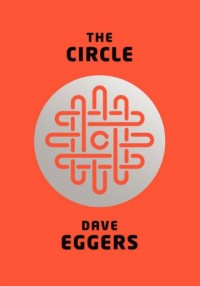25 Points: The Circle
 The Circle
The Circle
by Dave Eggers
Knopf, 2013
504 pages / $27.95 buy from Powell’s or Amazon
1. Nothing about The Circle is very surprising or new. Big Brother is a clichéd, outdated reality show. The privacy vs. transparency debate is as ubiquitous as the scope it describes. It’s obvious from page one which side the novel will end up on.
2. I don’t care about any of this. The transparency-obsessed campus of The Circle (a proxy for Google) is not an unappealing environment to me. Most of the time, it’s ridiculously attractive.
3. The relentless lists of online activities that the protagonist, Mae, conducts daily are not the downward spirals of doom they should be. Instead, the repetitive passages feel hypnotic and pleasurable and I live vicariously through Mae’s Internet high. I should read her decline into web addiction and over-sharing critically, but instead I feel the same breathless, click-through-again compulsiveness that I do staying up too late online, browsing websites and managing my own social media accounts.
4. I can’t figure out if I’m the exact target audience for The Circle, or the exact opposite of it. Are its warnings meant for those younger than me who’ve never known a world without Google? Or those older, who take a certain pride in refusing to get an Internet connection or email account?
5. The novel circles around the same few themes, visits the same few locations, and its protagonist, Mae, repeats the same tasks over and over again. This repetition gives me an intense, almost physical pleasure: a caffeine-like tightness in my brain, behind my ears; a lifting in my chest; the impulse the read as quickly as possible.
6. It’s more engaging to read about what Mae does on her computer than about her interactions with human characters, who are consistently flat—placeholders for perspectives.
7. Internet Rorschach: is this passage a dark chute of terror or an energizing, endorphin-generating endurance run? “[Mae] embarked on a flurry of activity, sending 4 zings and 32 comments and 88 smiles. In an hour, her PartiRank rose to 7,288. Breaking 7,000 was more difficult, but by 8, after joining and posting in 11 discussion groups, sending another 12 zings, one of them rated in the top 5,000 globally for that hour, and signing up for 67 more feeds, she’d done it. She was at 6,872, and she turned to her InnerCircle social feed. She was a few hundred posts behind, and she made her way through, replying to 70 or so messages, RSVPing to 11 events on campus, signing nine petitions and providing comments and constructive criticism on four products currently in beta. By 10:16, her rank was 5,342, and again, the plateau — this time at 5,000 — was hard to overcome. She wrote a series of zings about a new Circle service, allowing account holders to know whenever their name was mentioned in any messages sent from anyone else, and one of the zings, her seventh on the subject, caught fire and was rezinged 2,904 times, and this brought her PartiRank up to 3,887.” The passage continues for several more pages.
8. Fiction Writing 101: A complex character should always want something. For effective character development, ask: what does the character want? Mae wants a job at The Circle, and she gets it on page one. Her character is empty, simplistic, a shell.
9. Perhaps stripping Mae of any real wanting is the novel’s innovation: what happens when we want for nothing? Are we human anymore, or just shells of ourselves?
10. Something Mae sort of wants is a good rating of her work at The Circle (99% or higher for every inquiry she answers, which number in the hundreds each day). But this obsession with approval and high ratings doesn’t quite ring true to me: with quantity comes ambivalence, not a desire for quality. When reviews are always perfect, they have no meaning. READ MORE >
January 16th, 2014 / 4:38 pm
